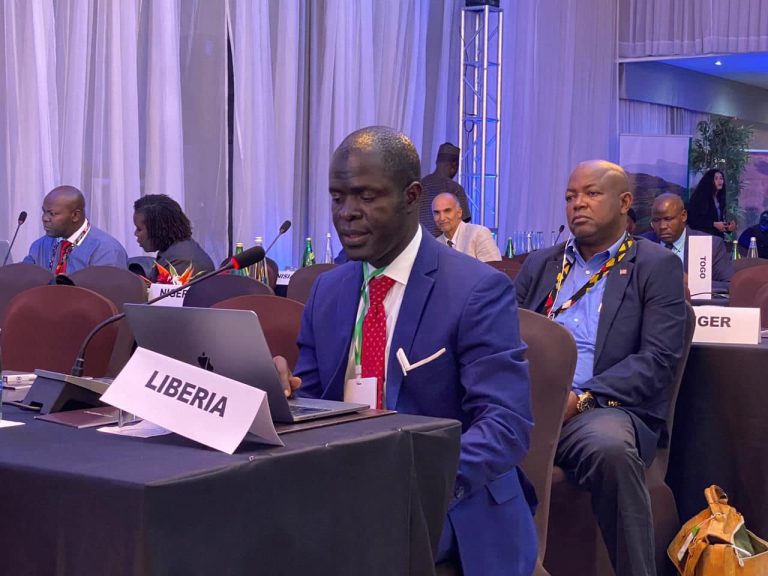Posts Categories
Latest Posts

Dr. Emmanuel Urey King Yarkpawolo, the Executive Director/Chief Executive Officer (CEO) of the Environmental Protection Agency of Liberia (EPA), participated in the 10th Special Session of the African Ministerial Conference on the Environment (AMCEN) held in Abidjan, Cote D’Ivoire from September 5-6, 2024. The conference centered on “Raising Africa’s ambition to address land degradation, desertification, and drought.”
The EPA was invited to the Session by Her Excellency Ms. Fitsum Aseefa Adela, Minister of Planning and Development of Ethiopia and President of the African Ministerial Conference on the Environment. The Session, held in partnership with the African Development Bank, the United Nations Environment Programme, the United Nations Convention to Combat Desertification, and other partners, followed a regional preparatory meeting for the 16th Session of the Conference to the United Nations Convention to Combat Desertification from August 30th to September 2nd, as well as a major groups and stakeholders meeting held from September 1st to 2nd, 2024.
During the session, the following topics were discussed: Africa’s efforts to mitigate drought, progress towards targets for land degradation neutrality, opportunities to improve ecosystem restoration, and partnerships and synergies to mobilize resources for addressing land degradation, desertification, and drought. Additionally, the session offered policy guidance to ensure the effective participation of African countries in the 16th Session of the Conference of Parties to the United Nations Convention to Combat Desertification (COP), scheduled in Riyadh, Saudi Arabia from December 2nd to 13th, 2024.
During the Special Session of AMCEN, the ministers were provided with updates on the preparations for the twenty-ninth session of the Conference of the Parties to the United Nations Framework Convention on Climate Change, the sixteenth session of the Conference of the Parties to the United Nations Convention on Biological Diversity, and the fifth session of the Intergovernmental Negotiating Committee tasked with developing an international legally binding instrument on plastic pollution, including its impact on the marine environment.
The AMCEN Meeting concluded with the adoption of one declaration and three decisions:
- Abidjan Declaration on raising Africa’s ambition to reduce desertification; land degradation and drought- The declaration mainly called for the establishment of a legally binding protocol on drought management and enhancing resilience within the framework of the United Nations Convention to Combat Desertification (UNCCD) in those countries experiencing Serious Drought and/or Desertification, particularly in Africa.
- Climate Change- The decision on Climate Change among others called for the adoption of an ambitious and outcome-based New Collective Quantified Goal on climate finance (NCQG) at COP29 that will support developing countries’ transitions to low carbon and climate resilient development through the implementation of Nationally Determined Contributions (NDCs) and National Adaptation Plans (NAPs.
- Opportunities to raise ambition to combat desertification and land degradation and enhance drought resilience in Africa – This decision among others called for member States to put in place measures on securing land tenure rights for Indigenous peoples and local communities, including small-scale land users, farmers, women, youth, to support the achievement of land degradation neutrality targets;
- Omnibus decision on advancing Africa’s common positions at conferences of parties and meetings- This decision among others commended the African Group of Negotiators on Plastic Pollution in articulating African priorities during the third and fourth sessions of the Intergovernmental Negotiation Committee to develop an international legally binding instrument on plastic pollution.
The African Ministerial Conference on the Environment (AMCEN) was established in Cairo, Egypt, in December 1985. The Mandate of AMCEN is to provide advocacy for environmental protection in Africa; to ensure that basic human needs are met adequately and in a sustainable manner; to ensure that social and economic development is realized at all levels; and to ensure that agricultural activities and practices meet the food security needs of the region.
